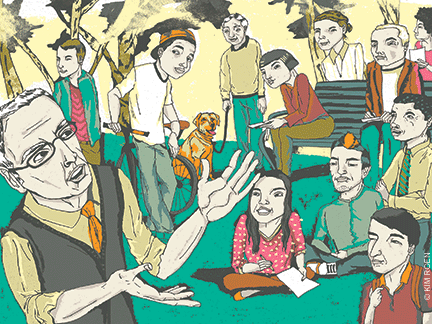
Step onto Penn’s campus on any given day, and chances are that you’ll find a University professor expounding upon his or her latest work in front of a public audience. From 60-second tidbits on the nature of poetry to tips on training your pet, it’s the golden age of the extracurricular lecture. These informal academic interludes have become so common that by now they’re almost old hat.
But when Valerie Ross, the former director of summer sessions in the old College of General Studies, first proposed the 60-Second Lecture Series in 1999, it was actually “slightly scandalous.”
According to Ross, who now heads the Critical Writing Program in the Center for Programs in Contemporary Writing, some professors expressed reservations about making remarks quite that brief. Ross knew she needed a “certain type of scholar” to get the ball rolling, someone “with a sense of humor.” So she asked Kelly Professor of English Al Filreis.
Filreis agreed, and delivered a sound-bite-sized talk called “The End of the Lecture as We Know It,” a humorous critique of “teacher-centered” pedagogy.
In 2003, the School of Arts and Sciences took over the 60-Second Lectures—which until then had only been given in the summer. Today those lectures are a regular fixture at Penn, along with at least half a dozen other (often lengthier) lecture series. Almost 14 years after Filreis’s lecture, extracurricular lectures have proliferated, on campus and off, aided partly by video-sharing websites like YouTube. (Videos of about 75 60-Second lectures—ranging from political-science assistant professor Yuhua Wang’s “Why Bribe?” to mathematics professor and College Dean Dennis DeTurck’s “Down With Fractions!”—are collected at www.sas.upenn.edu/60second.)
Each series puts its own spin on the concept, but they share the common goal of engaging a wider campus community. A good example is “Knowledge by the Slice,” which started two years ago and allows students, faculty, and staff to hear from Penn professors during their lunch hour. Topics vary, but they’re geared toward the layman. Most recently, for example, Salamishah Tillet, assistant professor of English and Africana Studies, gave a talk about “Nina Simone and Her Hip Hop Children.”
But you don’t even have to be on campus to hear about the latest scientific breakthroughs and academic research. Both the Penn Science Café and its sister series, the Penn Lightbulb Café, which is devoted to the humanities and social sciences, bring Penn professors to restaurants and taverns across University City.
Evan Lerner, the science news officer in Penn’s Office of University Communications, runs the Science Café. These public lectures expand Penn’s sphere of influence, he says.
Some lecture series go the extra mile—literally. “Engaging Minds” began in 2008 and has established itself as a traveling symposium that allows Penn professors to share their research with alumni across the globe. The series has recently graced locales ranging from New York to Shanghai to London.
While most public lectures on campus generally aim to capture a wide audience, the School of Veterinary Medicine has found success by carving out a small niche. Their “First Tuesday Lecture Series,” held at the New Bolton Center in Kennett Square, engages horse owners and enthusiasts in the Philadelphia area and across the world. For pet owners, the school also offers an “Animal Lovers Lecture Series.”
For Ross, the ability of these lectures to unite different groups is what makes them important. She vividly remembers watching a group of West Philadelphia 13-year-olds who happened to be passing by on bikes when Helen Davies, a professor of microbiology, gave a 60-Second Lecture. They put on the brakes, and then stayed afterwards to ask Davies questions.
“Those young boys sitting there having a conversation with a hugely distinguished scholar, who took in what she was saying and wanted to know more … it was very touching,” Ross says. And who knows when a free sample outside the classroom might just be the thing that reels someone into it.
—Matt Fernandez C’14

